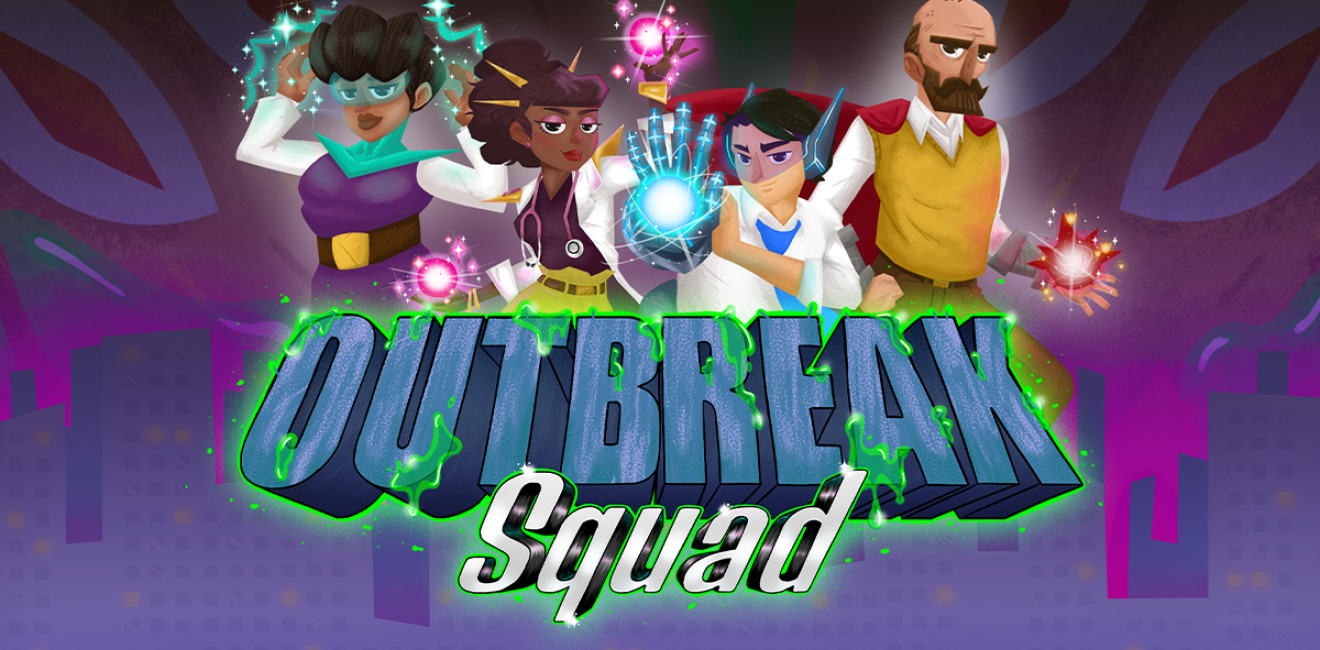
A blog of the Science and Technology Innovation Program
Disclaimers: Note that fighting giant mutated pathogens or trying to spread a plague are not part of the Center for Disease Control’s guidelines, and these are no replacement for following official health guidelines or listening to scientists. Please follow health officials’ instructions.
This list is intended for educational purposes, but some readers may find this content triggering. If you are feeling mental distress about the current crisis (note: original page has been deleted, a link to archive is provided), please do not read any further. If you are an educator and considering assigning games as a way to explain the crisis, please consider providing your students an ‘opt-out’ function in case this content could be triggering.
As coronavirus disease (COVID-19) sweeps the globe, everyone is looking for ways to understand (or even just cope) with a pandemic. Recognizing this, I wanted to see how games are being used to tackle this complex issue. I polled colleagues in the Federal Games Guild, an informal community of practice consisting of federal agencies interested in leveraging games in different capacities to meet mission goals, asking for games that could be used to illustrate or educate players on pandemics/epidemics.
The below list is some of those titles, which have a range of approaches to learning about pathogens and pandemics -- even some that are crowdsourcing solutions. Hopefully, this quick roundup of games can be a step towards a building understanding of what is happening in the world right now and the strategies used to contain it.
Tackling How Disease Spreads
Title: You Make Me Sick!: Bacteria and Viruses Learning Game
Developer: Filament Games
Price: $5.99 per account (intended for classroom use)
Platform: Webbrowser, Chromebook
Through a Department of Education's Institute of Education Service's Small Business Innovation Research grant award, Filament Games has produced a host of STEM-based educational games. Among these is You Make Me Sick!, which illustrates the impact of a pathogen on the human system. You begin by selecting a disease (virus or bacteria), learning how diseases can spread as well as what differentiates pathogens at a molecular level. You then try to infect a host, building up your army of pathogens for different conditions. Mapped to Common Core and Benchmarks for Science Literacy, it won the National STEM Video Games Challenge in 2011. The intended age group for this is middle school and up, and while publicly available, this game was designed for classroom integration.
While there are several intended learning outcomes mapped out on the website, explaining how transmission occurs may be the most relevant to COVID-19 right now. With this particular pandemic, the CDC has emphasized that this is a new disease and its modes of transmission are still being researched. People-to-people transmission is one way we believe it is spreading, hence the current emphasis on social distancing. While people-to-people is not addressed in the game, an emphasis in this game is on other modes of transfer -- e.g., touching a contaminated surface and then touching your eyes -- which can help explain why washing our hands is so crucial. Yet since people-to-people transfer is not addressed, for those using this as a learning tool for COVID-19, it is critical to explain this in addition to those options in the game.
Help Scientists Fight Back With Puzzles
Title: FoldIt
Developer: University of Washington Center for Game Science, University of Washington Institute for Protein Design, Northeastern University, Vanderbilt University, University of California, Davis, and University of Massachusetts, Dartmouth.
Price: Free
Platform: Computer (Windows/Mac/Linux)
If you are teleworking during this crisis, put that time saved on the commute to good use by solving puzzles for science -- and specifically, to help research SARS-CoV-2, the virus that causes COVID-19. FoldIt takes citizen science to the next level by asking players to solve puzzles by folding proteins, distributing data to players around the world and putting them to the task of manipulating visualizations of proteins. FoldIt leverages a point-based gamification system for the good of science; most viruses, like the SARS-CoV-2, HIV, and more are protein-based. This project spans multiple universities and is supported by grants from organizations including DARPA, NSF, and NIH.
Gamification of citizen science has the potential to increase domain knowledge specialized to that discipline (Bowser et al., 2013), as well as engage a broader base of volunteers than those who would normally participate in the scientific process. Thus, projects like FoldIt not only have the opportunity to include non-scientists in science but also increase understanding about molecular biology.
In terms of the current pandemic, to put it simply, crowdsourcing has the capacity to make science go faster. Instead of one scientist or even one lab, FoldIt distributes to thousands to tackle the same data set, expediting the research process (Khatib et al., Nov 2019). Players famously solved the structure of an HIV-related protein in less than three weeks in 2011, and last year developed an entirely new protein. They are hoping to do it again by tackling SARS-CoV-2, as seen here:
And if you don’t have the time to play puzzles, you can download Folding@Home, a different distributed computing project for disease research based out of Stanford University’s Pande Lab. This uses idle resources from your personal computer to fold proteins with no input from you, the user. As of March 10, 2020 a new update includes SARS-CoV-2.
Battle Diseases With Research, Policy
Title: Outbreak Squad
Developer: Learning Games Lab at New Mexico State University in partnership with the University of Tennessee
Price: Free
Platform: Webbrowser
In addition to tackling diseases at a molecular level, policy can have a major impact on response. Outbreak Squad is a new game, launched in December 2019, based upon work supported by the SPECA Challenge Grant, National Institute of Food and Agriculture, and the U.S. Department of Agriculture. Outbreak Squad is a part of the Hands On – Real World Classroom curriculum, designed to integrate food safety science into mathematics, science, social studies and language arts instruction. Taking historical examples of outbreaks that started from contaminated food, Outbreak Squad abstracts how different fields like research, education and outreach, regulatory or enforcement bodies, and healthcare can be used to tackle outbreaks. Each approach is represented by a superhero with a unique set of abilities, from promoting education and outreach, to treating the sick, to developing cures for the disease. These superheroes are aligned with careers fields that tackling disease outbreak as mapped here in "meet the squad." However, it is through collaborating across fields that you are able to most effectively tackle outbreaks like E. coli or Hepatitis A.
This game requires balancing: no one strategy or hero can defeat the outbreak. In terms of strategy, one salient theme in the case of many outbreaks is the difference between treating low-risk populations versus high-risk populations. Because of their status, although high-risk populations may be smaller than the low-risk population (as demonstrated in this game), the impact of the disease is severe. That’s why options like quarantine and social-distancing are critical.
Throughout the game, players must also evaluate their actions against policy events that could occur during an outbreak, such as a lack of faith in treatment options or a flood of emergency funding. A key learning goal of the game is to recognize that some policy decisions bolster (or impair) action in an outbreak.
Even though COVID-19 is not a food-based disease, many of similar themes apply. In an educational setting, it could be a good exercise to build off the game and use it to contextualize what is happening now. One way to do this might be to break down some of the powers of the superhero squad and in-game events with examples of how they are manifesting in the real world. Why does the ability of "quarantine," a power of the healthcare professional, have everyone stay in place? What is a hazard analysis, and why is that helpful? A further discussion point might be the real-world impact of those options presented in the game, and what options kind of policy, research or approaches might be implemented to prevent future outbreaks.
Eliminate The Vector
Title: Humans vs. Mosquitoes
Developer: Yale University and Parsons The New School for Design
Price: Varies; Live Action, Free; Card Game, $18.99
Platform: Live Action and Card Game
Originally developed in 2011 a field game like Tag, Humans vs. Mosquitos is intended to educate children in developing countries new to mosquito populations and vector-borne disease as a result of climate change. It was eventually picked up by Red Cross Red Crescent as part of their programming. The game has three mediums: a tag-like game, an indoor live action game, and a board game. In all, players divide up into two teams (humans and mosquitoes) and attempt to eradicate each other. Mosquitoes try to bite humans and make eggs in breeding grounds. Humans, similarly, are trying to eradicate mosquito breeding grounds and live. The primary learning goal is to illustrate how vector-borne diseases work and the cost of those diseases, with an emphasis on stopping vector-borne diseases at the source through the eradication of breeding grounds.
While recognizing that many of us are a long way away from being able to get out and run around in large groups, the board game and indoor version adapted by the Red Cross Red Crescent could be pertinent exercise. This game demonstrates how to construct a low-resource learning tool, but also the ways traditional games -- like tag -- can be adapted. In fact, the Huffington Post reports that U.S. children are already making this adaptation themselves, ad-libbing songs and playing “coronavirus tag” as a modern-day “Ring Around the Rosie.” As the report suggests, learner-steered play can be a healthy outlet to explore the topic. Extending that argument, adding in educational components to that play where children learn about the pandemic and know of a solution to the cause, could help children feel empowered.
Save The World...
Title: Pandemic
Developer: Z-Man Games
Price: Varies; Base Board Game, $39.99; Computer, $9.99
Platform: Board Game and Computer (Steam)
Although not designed as an educational tool, Z-Man Games' Pandemic is a board game that has defined a genre. Your board is a map of the world marked out with major cities, divided into regional pandemics. Your job is to work with other players to save the world. Each person picks the role of someone from the CDC who would be assisting in the case of a pandemic -- a medic, a researcher, a quarantine specialist, a scientist, a dispatcher, and so on. You collaborate by treating diseases, zooming from Atlanta around the world, setting up research facilities and trying to cure the disease. Meanwhile, each turn the diseases continue to spread and outbreaks are inevitable. While you do not always win, you do always need to work together to try to win.
This is a game more about collaboration and teamwork than it is about education or modeling pandemics, as exemplified by the fact the diseases are not named. The outbreak mechanic is not based on any scientific models, either, but an abstraction of how a disease can spread. Put bluntly, you are more likely to learn about teamwork and geography than epidemiology from playing this game. However, if you are looking for a game that may be a tool for a coping mechanism -- or just fun -- this game may be a good step in that direction. Who doesn’t want to save the world?
...Or Destroy the World
Title: Plague Inc
Developer: Ndemic Creations
Price: Varies; Mobile App, $0.99; Computer, $14.99; Board Game, $38.99; additional downloadable content adds to cost
Platform: Mobile App, Computer (Steam), and Board Game
In Plague Inc., you are not trying to save the world, you are trying to destroy it. You begin as a plague (with many types to choose from) with patient zero, with the goal of wiping out the world population. The simulation allows you to evolve over time, adapting the way the plague is spread, its resistances, and its symptoms. If a cure is developed before you have a chance to wipe out humanity, you lose.
Originally released in 2012, Plague Inc. is available across nearly all platforms (mobile, PC, console, and a board game), and has been gaining widespread popularity in streams and on charts due to the recent outbreaks. Plague Inc: Evolved (PC, Console) has a slew of features, including customizable scenarios (some of the most popular now being, as you might have guessed, a play on COVID-19) and a competitive multiplayer mode.
For many, there is a concern about the game spreading misinformation about COVID-19 or misrepresentation of the ways in which diseases evolve, spread, and outbreak. Earlier this year, the game was popular in China but has since been removed from the app store. In a recent press statement (January 23, 2020) responding to the games popularity in facing COVID-19, Ndemic Creations emphasized that although the game has been recognized by the CDC and other leading medical organizations, "please remember that Plague Inc. is a game, not a scientific model and that the current COVID-19 outbreak is a very real situation which is impacting a huge number of people."
Despite its shortcomings, the media has highlighted that, for some, games like Plague Inc. can be used as a means of coping and tackling the uncertainty that comes with COVID-19. Games can be a powerful tool for lowering the barrier to entry for complex topics, by elucidating interest and empowering players.
Conclusion
The games above represent a range of different opportunities to approach this crisis in an educational and interactive way. From learning about how diseases spread to the policies that impact response, being the hero or being the disease, there are a range of ways that we can tackle diseases in a virtual and safe space. It is likely that in the next few weeks, we will see more new games or new adaptations that deal directly with COVID-19. As you play, consider what you can learn and recognize the gaps in knowledge.
Each of the games presented here, no matter if they fall more into a fictionalization of pandemics (Pandemic, Plague Inc.) or were designed as a strictly educational tool, allow the player to walk away with learning something. The power in these games is to lower the barrier of entry into tackling something complex and allowing players to feel as though they have some agency over a terrifying situation. The more we can empower ourselves to learn, the more equipped we will be to help act.
Author


Serious Games Initiative
The Serious Games Initiative communicates science and policy complexities through the world’s most dynamic medium: gaming. Read more


Science and Technology Innovation Program
The Science and Technology Innovation Program (STIP) serves as the bridge between technologists, policymakers, industry, and global stakeholders. Read more





